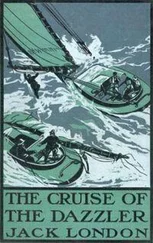Jack London - The Jacket (The Star-Rover)
Здесь есть возможность читать онлайн «Jack London - The Jacket (The Star-Rover)» весь текст электронной книги совершенно бесплатно (целиком полную версию без сокращений). В некоторых случаях можно слушать аудио, скачать через торрент в формате fb2 и присутствует краткое содержание. Жанр: Классическая проза, на английском языке. Описание произведения, (предисловие) а так же отзывы посетителей доступны на портале библиотеки ЛибКат.
- Название:The Jacket (The Star-Rover)
- Автор:
- Жанр:
- Год:неизвестен
- ISBN:нет данных
- Рейтинг книги:4 / 5. Голосов: 1
-
Избранное:Добавить в избранное
- Отзывы:
-
Ваша оценка:
- 80
- 1
- 2
- 3
- 4
- 5
The Jacket (The Star-Rover): краткое содержание, описание и аннотация
Предлагаем к чтению аннотацию, описание, краткое содержание или предисловие (зависит от того, что написал сам автор книги «The Jacket (The Star-Rover)»). Если вы не нашли необходимую информацию о книге — напишите в комментариях, мы постараемся отыскать её.
The Jacket (The Star-Rover) — читать онлайн бесплатно полную книгу (весь текст) целиком
Ниже представлен текст книги, разбитый по страницам. Система сохранения места последней прочитанной страницы, позволяет с удобством читать онлайн бесплатно книгу «The Jacket (The Star-Rover)», без необходимости каждый раз заново искать на чём Вы остановились. Поставьте закладку, и сможете в любой момент перейти на страницу, на которой закончили чтение.
Интервал:
Закладка:
“So said they in old Rome , Pons, when Nero made torches of them to light his sports.”
Pons regarded me pityingly.
“Too much learning is a sickness,” he complained. “I was always opposed to it. But you must have your will and drag my old body about with you—a-studying astronomy and numbers in Venice, poetry and all the Italian fol-de-rols in Florence, and astrology in Pisa, and God knows what in that madman country of Germany. Pish for the philosophers! I tell you, master, I, Pons, your servant, a poor old man who knows not a letter from a pike-staff—I tell you God lives, and the time you shall appear before him is short.” He paused with sudden recollection, and added: “He is here, the priest you spoke of.”
On the instant I remembered my engagement.
“Why did you not tell me before?” I demanded angrily.
“What did it matter?” Pons shrugged his shoulders. “Has he not been waiting two hours as it is?”
“Why didn’t you call me?”
He regarded me with a thoughtful, censorious eye.
“And you rolling to bed and shouting like chanticleer, ‘Sing cucu, sing cucu, cucu nu nu cucu, sing cucu, sing cucu, sing cucu, sing cucu.’”
He mocked me with the senseless refrain in an ear-jangling falsetto. Without doubt I had bawled the nonsense out on my way to bed.
“You have a good memory,” I commented drily, as I essayed a moment to drape my shoulders with the new sable cloak ere I tossed it to Pons to put aside. He shook his head sourly.
“No need of memory when you roared it over and over for the thousandth time till half the inn was a-knock at the door to spit you for the sleep-killer you were. And when I had you decently in the bed, did you not call me to you and command, if the devil called, to tell him my lady slept? And did you not call me back again, and, with a grip on my arm that leaves it bruised and black this day, command me, as I loved life, fat meat, and the warm fire, to call you not of the morning save for one thing?”
“Which was?” I prompted, unable for the life of me to guess what I could have said.
“Which was the heart of one, a black buzzard, you said, by name Martinelli—whoever he may be—for the heart of Martinelli smoking on a gold platter. The platter must be gold, you said; and you said I must call you by singing, ‘Sing cucu, sing cucu, sing cucu.’ Whereat you began to teach me how to sing, ‘Sing cucu, sing cucu, sing cucu.’”
And when Pons had said the name, I knew it at once for the priest, Martinelli, who had been knocking his heels two mortal hours in the room without.
When Martinelli was permitted to enter and as he saluted me by title and name, I knew at once my name and all of it. I was Count Guillaume de Sainte-Maure. (You see, only could I know then, and remember afterward, what was in my conscious mind.)
The priest was Italian, dark and small, lean as with fasting or with a wasting hunger not of this world, and his hands were as small and slender as a woman’s. But his eyes! They were cunning and trustless, narrow-slitted and heavy-lidded, at one and the same time as sharp as a ferret’s and as indolent as a basking lizard’s.
“There has been much delay, Count de Sainte-Maure,” he began promptly, when Pons had left the room at a glance from me. “He whom I serve grows impatient.”
“Change your tune, priest,” I broke in angrily. “Remember, you are not now in Rome .”
“My august master—” he began.
“Rules augustly in Rome , mayhap,” I again interrupted. “This is France .”
Martinelli shrugged his shoulders meekly and patiently, but his eyes, gleaming like a basilisk’s, gave his shoulders the lie.
“My august master has some concern with the doings of France ,” he said quietly. “The lady is not for you. My master has other plans. . .” He moistened his thin lips with his tongue. “Other plans for the lady . . . and for you.”
Of course, by the lady I knew he referred to the great Duchess Philippa, widow of Geoffrey, last Duke of Aquitaine. But great duchess, widow, and all, Philippa was a woman, and young, and gay, and beautiful, and, by my faith, fashioned for me.
“What are his plans?” I demanded bluntly.
“They are deep and wide, Count Sainte-Maure—too deep and wide for me to presume to imagine, much less know or discuss with you or any man.”
“Oh, I know big things are afoot and slimy worms squirming underground,” I said.
“They told me you were stubborn-necked, but I have obeyed commands.”
Martinelli arose to leave, and I arose with him.
“I said it was useless,” he went on. “But the last chance to change your mind was accorded you. My august master deals more fairly than fair.”
“Oh, well, I’ll think the matter over,” I said airily, as I bowed the priest to the door.
He stopped abruptly at the threshold.
“The time for thinking is past,” he said. “It is decision I came for.”
“I will think the matter over,” I repeated, then added, as afterthought: “If the lady’s plans do not accord with mine, then mayhap the plans of your master may fruit as he desires. For remember, priest, he is no master of mine.”
“You do not know my master,” he said solemnly.
“Nor do I wish to know him,” I retorted.
And I listened to the lithe, light step of the little intriguing priest go down the creaking stairs.
Did I go into the minutiж of detail of all that I saw this half a day and half a night that I was Count Guillaume de Sainte-Maure, not ten books the size of this I am writing could contain the totality of the matter. Much I shall skip; in fact, I shall skip almost all; for never yet have I heard of a condemned man being reprieved in order that he might complete his memoirs—at least, not in California .
When I rode out in Paris that day it was the Paris of centuries agone. The narrow streets were an unsanitary scandal of filth and slime. But I must skip. And skip I shall, all of the afternoon’s events, all of the ride outside the walls, of the grand fкte given by Hugh de Meung, of the feasting and the drinking in which I took little part. Only of the end of the adventure will I write, which begins with where I stood jesting with Philippa herself—ah, dear God, she was wondrous beautiful. A great lady—ay, but before that, and after that, and always, a woman.
We laughed and jested lightly enough, as about us jostled the merry throng; but under our jesting was the deep earnestness of man and woman well advanced across the threshold of love and yet not too sure each of the other. I shall not describe her. She was small, exquisitely slender—but there, I am describing her. In brief, she was the one woman in the world for me, and little I recked the long arm of that gray old man in Rome could reach out half across Europe between my woman and me.
And the Italian, Fortini, leaned to my shoulder and whispered:
“One who desires to speak.”
“One who must wait my pleasure,” I answered shortly.
“I wait no man’s pleasure,” was his equally short reply.
And, while my blood boiled, I remembered the priest, Martinelli, and the gray old man at Rome . The thing was clear. It was deliberate. It was the long arm. Fortini smiled lazily at me while I thus paused for the moment to debate, but in his smile was the essence of all insolence.
This, of all times, was the time I should have been cool. But the old red anger began to kindle in me. This was the work of the priest. This was the Fortini, poverished of all save lineage, reckoned the best sword come up out of Italy in half a score of years. To-night it was Fortini. If he failed the gray old man’s command to-morrow it would be another sword, the next day another. And, perchance still failing, then might I expect the common bravo’s steel in my back or the common poisoner’s philter in my wine, my meat, or bread.
Читать дальшеИнтервал:
Закладка:
Похожие книги на «The Jacket (The Star-Rover)»
Представляем Вашему вниманию похожие книги на «The Jacket (The Star-Rover)» списком для выбора. Мы отобрали схожую по названию и смыслу литературу в надежде предоставить читателям больше вариантов отыскать новые, интересные, ещё непрочитанные произведения.
Обсуждение, отзывы о книге «The Jacket (The Star-Rover)» и просто собственные мнения читателей. Оставьте ваши комментарии, напишите, что Вы думаете о произведении, его смысле или главных героях. Укажите что конкретно понравилось, а что нет, и почему Вы так считаете.







